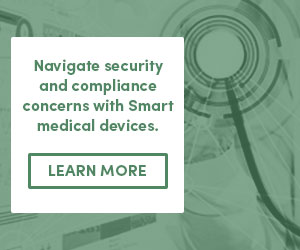Traditional medical devices are quickly going the way of the ear horn for one simple reason: their valuable data is confined to the device. Some have short-term storage capabilities. None, however, capture data over time for long-term analytics or storage. Intelligent medical devices (IMDs), on the other hand, come natively equipped for data gathering, transmission and analytics, as well as cloud connectivity.
This represents nothing short of the next revolution in medical care. Picture a world where a heart pump alerts a doctor to a patient’s potentially fatal abnormality long before even the best testing would. Pill bottles will remind seniors when to take their medication or prevent them from taking the same medication twice. Ultrasound and X-ray machines will flag potential problems traditionally found only after careful study by qualified physicians, freeing these physicians to concentrate on more challenging tasks.
But IMDs also carry huge risks. That heart pump mentioned above can theoretically be hacked. Data collected by the heart pump can be obtained by cybercriminals. In a worst case scenario, the proper functioning of the pump can be compromised, resulting in serious injury or even fatality. On the less grim side of things, the FDA is going to want to make sure a new smart device is just as compliant as the dumb one, meaning companies will have to jump through hoops again to get new devices approved.
 Businesses looking to transition into IMDs have a long and winding road ahead. In fact, many companies looking to be part of this wave in the future underestimate just how much their technological footprint will change. A traditional medical device has little more than the barest firmware to keep it running. IMDs require new firmware, an operating system and running processes.
Businesses looking to transition into IMDs have a long and winding road ahead. In fact, many companies looking to be part of this wave in the future underestimate just how much their technological footprint will change. A traditional medical device has little more than the barest firmware to keep it running. IMDs require new firmware, an operating system and running processes.
They must also be able to communicate with many of the over 600 IoT platforms currently in use. Data must transfer quickly and efficiently over Ethernet, Wi-Fi and LTE among others. It not only needs to make this journey quickly, it needs to make it securely. Protocol translation is often required, which is no small task in and of itself.
This is all far more complex than the sometimes frustrating, but rather cookie-cutter format current FDA regulations require. SPK specializes in helping companies who are designing FDA compliant IMDs with the embedded programming, firmware, operating systems, networking, and cloud solutions needed as part of these products. Once completed, we can manage and monitor these devices, including a cybersecurity program, ensuring you’re able to scale. All the way from development to testing to deployment, SPK guides your company into the 21st Century of IMDs. Talk to a specialized consultant today about how we can help your organization grow into the new millennium.
Check out our white paper: Navigating Compliance and Cyber Security Concerns in Smart Medical Devices to gain an in-depth knowledge on the topic of intelligent medical devices.







